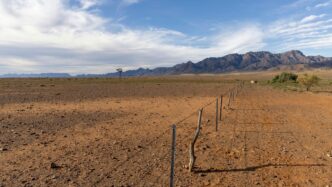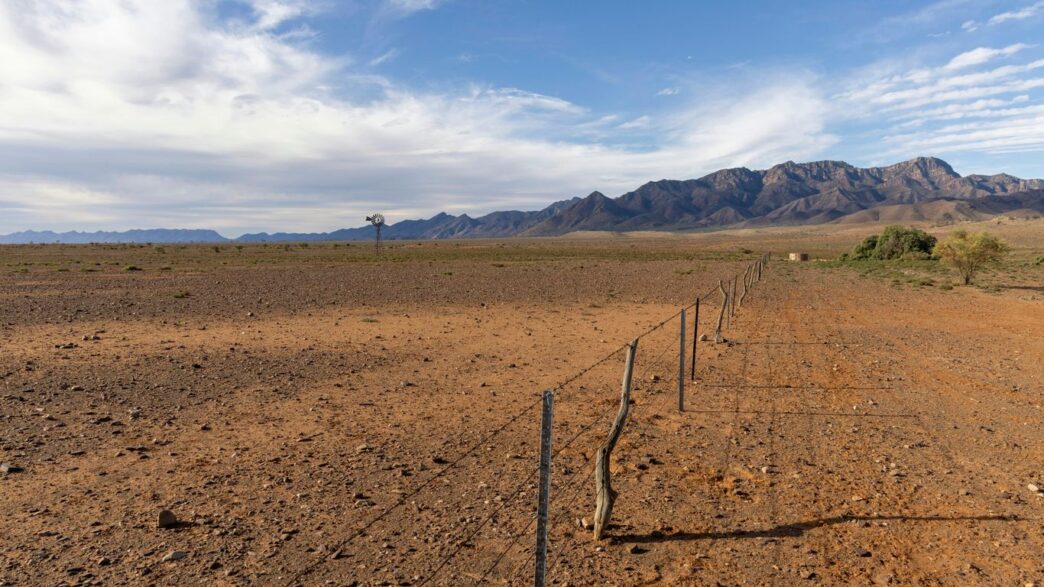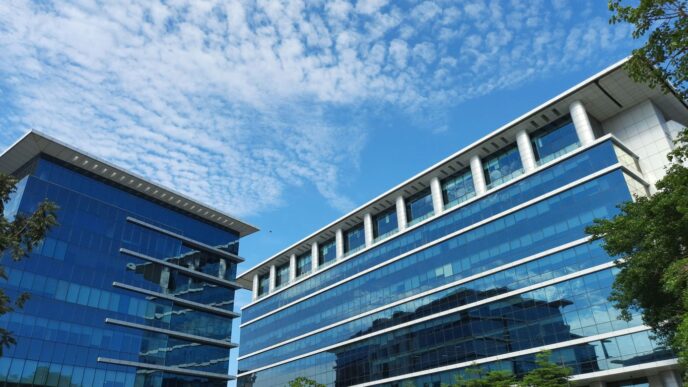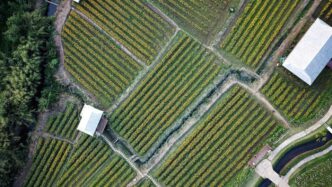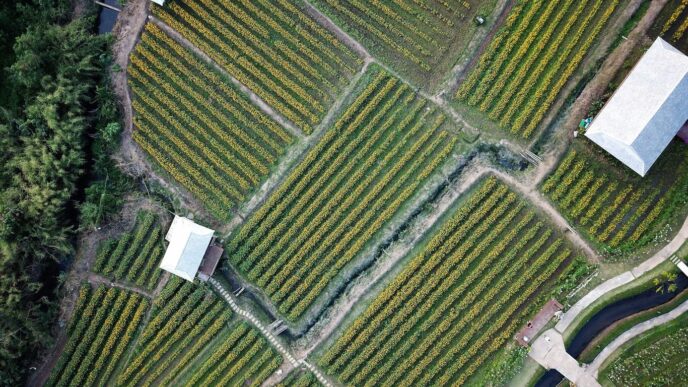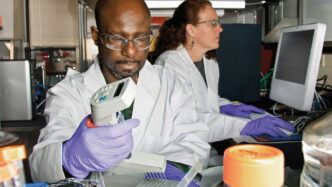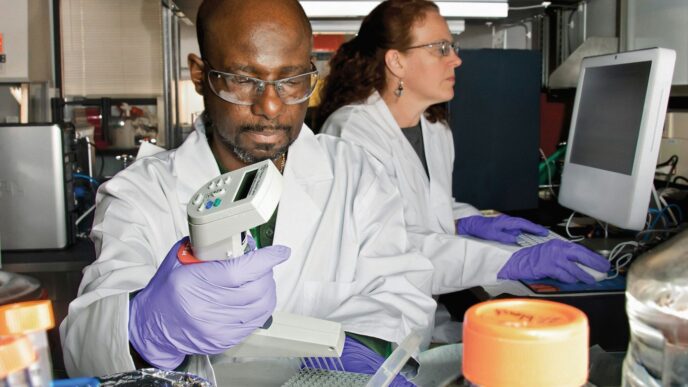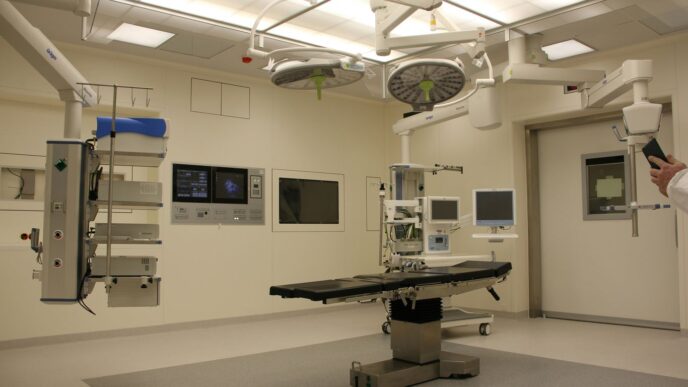It might seem impossible to grow much of anything in a scorching desert, right? Well, Israel is proving everyone wrong. This country, with a huge chunk of its land being arid, has become a total powerhouse in farming. They’ve figured out some seriously clever ways to make crops grow, even with hardly any water and in super hot conditions. It’s not just about survival anymore; it’s about leading the way with smart tech and new ideas for growing food. This is desert agriculture Israel style, and it’s pretty amazing.
Key Takeaways
- Israel has achieved remarkable agricultural yields, even in desert conditions, producing more food per hectare than many other countries.
- Pioneering water management is central to Israel’s success, with advanced drip irrigation, extensive wastewater recycling, and desalination technologies being key.
- Cutting-edge AgTech, including AI, drones, and robotics, helps optimize resource use and improve crop performance in arid environments.
- Sustainable farming practices, like controlled environment agriculture and vertical farming, are vital for maximizing output with minimal resources.
- Israel’s innovations in desert agriculture offer a crucial blueprint for global food security and climate adaptation in water-scarce regions.
Revolutionizing Arid Land Farming

It might seem a bit wild to think about farming in the desert. I mean, sand, heat, not much water – sounds like a recipe for disaster, right? But that’s exactly where Israel has been making some serious waves. For decades, this country, with a huge chunk of its land being desert, has been figuring out how to grow food in some of the toughest conditions on Earth. It’s not just about survival anymore; it’s about thriving and showing the rest of the world how it’s done.
Israel’s Remarkable Agricultural Yields
When you look at the numbers, it’s pretty mind-blowing. Despite having a lot of desert land, Israel’s farming output is seriously impressive. Take milk production, for instance. Israeli cows are producing way more milk than cows in places like North America or Europe. And it’s not just dairy. Their tomato yields are off the charts compared to the global average. Even citrus fruit production is higher than in many other regions. It really shows that with the right approach, you can get a lot out of the land, even when it’s not exactly prime real estate for farming.
Here’s a quick look at some yield comparisons:
| Crop | Israel’s Yield (per hectare) | Comparison Region | Yield (per hectare) |
|---|---|---|---|
| Milk | 13,000 liters | North America | 10,000 liters |
| Europe | 6,000 liters | ||
| Tomato | 300 tonnes | Global Average | 50 tonnes |
| Citrus | 262 tonnes | North America | 243 tonnes |
| Europe | 211 tonnes |
Overcoming Arid Conditions Through Innovation
So, how do they do it? It’s all about smart thinking and new technology. Israel has become a hub for agricultural innovation, especially when it comes to dealing with dry climates. They’ve developed and refined techniques that make the most of every drop of water and every bit of sunlight. It’s a constant process of trial and error, but the results speak for themselves. They’re not just adapting to the desert; they’re making it work for them.
Some of the key strategies include:
- Water Conservation: This is probably the biggest one. Finding ways to use less water and reuse what’s available is critical.
- Precision Farming: Using technology to understand exactly what crops need, when they need it, and where.
- Crop Selection and Development: Researching and growing crops that are naturally more suited to dry and hot conditions, or improving existing ones.
- Soil Management: Finding ways to improve soil quality and retain moisture, even in sandy environments.
Desert Agriculture: A Global Climate Solution
What Israel is doing in its deserts isn’t just a local success story. It’s becoming a blueprint for other parts of the world facing similar challenges, especially with climate change making dry spells more common. The techniques and technologies developed here offer real hope for food security in arid and semi-arid regions globally. By sharing these innovations, Israel is contributing a vital piece to the global effort to adapt to a changing climate and feed a growing population. It’s a powerful example of how human ingenuity can turn environmental challenges into opportunities.
Pioneering Water Management Technologies
Water is pretty important, right? And with climate change messing with rain patterns and making things drier, it’s becoming a bigger deal everywhere. Israel, being a country that’s mostly desert, has had to get really smart about water. They’ve basically turned their water scarcity into a reason to invent some seriously cool stuff.
Advanced Drip Irrigation Systems
This is where Israel really made a name for itself. Back in the day, watering crops meant flooding fields, which is a huge waste of water, especially in dry places. Then came drip irrigation, and Israel was right there at the front. Instead of spraying water everywhere, this system delivers water right to the plant’s roots, drop by drop. It’s super efficient. You can control exactly how much water each plant gets, and when. This means less water is lost to evaporation or just soaking into the ground where it’s not needed. It’s made a massive difference in how much they can grow with so little water.
Wastewater Recycling for Agriculture
So, Israel doesn’t just use fresh water. They’ve gotten really good at cleaning up used water – like from homes and industries – and using it again for farming. They treat almost 90% of their wastewater, which is way more than most countries. This recycled water is then used to irrigate crops. It’s a smart way to add to their water supply without using up precious freshwater resources. It’s a closed-loop system that really helps them keep their farms going, even when natural water sources are low.
Desalination and Nanotechnology Advancements
When you think about getting fresh water from the sea, it used to be really expensive and used a lot of energy. But Israel has been pushing the boundaries here too. They’ve invested heavily in desalination plants, making seawater drinkable and usable for agriculture. What’s really exciting for the future is how they’re looking at nanotechnology. Think tiny, tiny materials that can make the filtering process in desalination much faster and cheaper. This could be a game-changer for making fresh water more available not just in Israel, but all over the world where water is scarce.
Cutting-Edge AgTech Innovations
Israel isn’t just tinkering with farming; they’re building the future of it, especially when the land is dry and tough. They’re using some seriously smart tech to get more out of every drop of water and every bit of soil. It’s pretty wild to see how they’re making deserts bloom.
Precision Agriculture with AI and Drones
Forget just looking at fields from the ground. Israeli farmers are now using AI and drones to get a bird’s-eye view, and then some. These flying gadgets can map out fields with incredible detail, spotting problems like pests or nutrient deficiencies long before a person could. AI then takes this data and figures out exactly what each part of the field needs – maybe a little more water here, or some specific fertilizer there. This means farmers aren’t wasting resources by treating the whole field the same way. It’s all about giving each plant exactly what it needs, when it needs it.
Here’s a peek at what this looks like:
- Data Collection: Drones equipped with special cameras fly over fields, capturing images that show things like plant health and soil moisture.
- Analysis: AI software crunches this data, identifying patterns and pinpointing areas that need attention.
- Actionable Insights: Farmers get clear recommendations, like where to adjust irrigation or apply nutrients, often down to the individual plant level.
Biotechnology for Enhanced Crop Performance
Beyond the tech you can see, there’s a whole lot happening at the genetic level. Israeli scientists are using biotechnology to develop crops that are tougher, grow better, and need fewer resources. Think plants that can handle salty soil or go longer without water. They’re also looking at ways to make crops more resistant to diseases and pests, cutting down on the need for chemical treatments. It’s about breeding smarter, not just harder.
Some of the goals here include:
- Developing seeds that naturally tolerate drought conditions.
- Creating plants with better resistance to common agricultural pests.
- Improving nutrient uptake to reduce fertilizer use.
Robotics in Harvesting and Field Management
Harvest time can be a real headache, especially with labor shortages. So, naturally, Israel is bringing in the robots. We’re talking about machines that can carefully pick delicate fruits, prune plants with precision, or even manage tasks like weeding. These robots can work around the clock and in conditions that might be tough for people. It’s not about replacing farmers, but about giving them tools to make the hard jobs easier and more efficient. This frees up people to focus on the bigger picture of managing their farms.
Sustainable Farming Practices in the Desert
It might seem impossible to grow food in a desert, but Israel has figured out how to do it, and do it well. They’ve developed smart ways to farm that don’t waste precious resources. It’s all about using what you have very carefully and using technology to help.
Optimizing Resource Use in Arid Climates
When you live somewhere dry, every drop of water counts. Israel has become really good at making sure water isn’t wasted. They use advanced irrigation that delivers water right to the plant roots, so less water evaporates. They also treat and reuse almost all their wastewater for farming, which is a huge deal. This means they can grow a lot of food without needing a lot of fresh water. It’s a clever system that makes the most of what’s available.
Controlled Environment Agriculture Solutions
Sometimes, the best way to grow crops in a tough climate is to create your own perfect environment. This is where controlled environment agriculture, or CEA, comes in. Think of greenhouses, but much smarter. These setups allow farmers to precisely manage temperature, humidity, and light. This means crops can grow year-round, protected from harsh desert conditions like extreme heat and sandstorms. It also helps reduce the need for pesticides because the environment is more controlled.
Vertical Farming and Hydroponics
These are two more ways Israel is getting creative with farming. Vertical farming involves growing crops in stacked layers, often indoors. This uses much less land, which is a big advantage in arid areas where land might be scarce or difficult to farm traditionally. Hydroponics is a method where plants grow in water, not soil. This uses significantly less water than traditional farming. By combining these techniques, farmers can grow a lot of produce in a small space with very little water, making it a super efficient way to farm in the desert.
Key Players in Israeli AgTech
Israel’s agricultural technology scene is buzzing with activity, and it’s not just about big companies. Lots of smaller, innovative outfits are popping up too, all trying to solve real problems for farmers, especially those dealing with tough conditions. It’s a pretty impressive ecosystem, really.
Leading Companies in Irrigation and Crop Protection
When you talk about Israeli AgTech, you can’t skip over the companies that got the ball rolling. Think about Netafim, the folks who basically invented drip irrigation. They figured out how to get water and nutrients right to the plant roots, saving tons of water and boosting harvests. Then there’s ADAMA, a major player in crop protection, making sure plants stay healthy and productive. These companies have been around, refining their tech and showing the world what’s possible.
Ag Analytics and Sensor Technology
Beyond just watering and protecting crops, there’s a whole group focused on understanding what’s happening in the field. Companies like CropX are putting sensors in the ground to measure soil conditions. They then use that data, along with smart software, to tell farmers exactly what their plants need – like when and how much to water or fertilize. It’s all about using data to be smarter with resources. SupPlant is another one, using sensors and AI to figure out when plants are stressed, especially from lack of water, and adjusting irrigation accordingly. It’s pretty neat how they’re using tech to conserve water.
Controlled Environment Agriculture Technology Providers
For those looking to grow crops in more controlled settings, Israel has some serious innovators. Companies like GrowTec are building advanced systems for indoor farms, helping to grow things like tomatoes and cucumbers efficiently. They’ve got a lot of experience and have set up facilities all over the place. Then there’s GrowDirector, which focuses on the smart climate control systems needed for these high-tech greenhouses. Getting the temperature, humidity, and light just right is key, and they’re making systems that do that automatically. It’s a big step towards more predictable and efficient farming, especially in places where the natural climate is harsh.
Global Impact and Future Prospects

Israel’s journey in desert agriculture isn’t just a local success story; it’s becoming a blueprint for the world. As we look ahead, the innovations born from arid conditions here are finding their way to farms across the globe, helping tackle some pretty big challenges.
Expanding International Partnerships
It’s clear that Israeli AgTech companies are increasingly teaming up with businesses in other countries. This isn’t just about selling technology; it’s about sharing knowledge and adapting what works here to different climates and farming styles. Think of it as a global agricultural exchange program. These collaborations help Israeli innovations reach new markets and, in turn, expose local farmers to advanced techniques. The government is also stepping in, trying to smooth the way for more international trade deals focused on farming tech. It’s a win-win, really, helping both Israel and other nations improve their food production.
Addressing Future Water Scarcity Challenges
Water scarcity is a problem that’s only going to get bigger for many parts of the world. Israel, having lived with this challenge for decades, is in a unique position to help. The work being done here on recycling wastewater and improving desalination is more important than ever. Future developments are likely to focus on making these processes even more efficient and less costly, perhaps through new materials and nanotechnology. This could mean that clean water for farming becomes more accessible, even in the driest regions.
Adapting to Evolving Climate Patterns
Climate change means more unpredictable weather, and that’s tough on farming everywhere. Israeli AgTech is constantly being pushed to develop crops that can handle more extreme heat, less predictable rainfall, and changing soil conditions. This means a big focus on:
- Developing hardier crop varieties through biotechnology.
- Creating smarter irrigation systems that use every drop of water wisely.
- Improving soil health monitoring to better manage resources.
Beyond traditional farming, methods like vertical farming and hydroponics, which use far less water and land, are also seeing a lot of innovation here. These approaches are particularly suited for urban areas or places where traditional agriculture is difficult, offering a way to grow food closer to where people live, even in challenging environments. It’s all about finding smart ways to keep producing food, no matter what the weather throws at us.
Looking Ahead
So, what’s the takeaway from all this? Israel’s journey from a country with a lot of desert to a leader in growing food there is pretty inspiring. They’ve shown that with smart thinking and new tech, you can make things grow even when the conditions are tough. It’s not just about Israel, either. As more places deal with dry weather and water shortages because of climate change, what Israel has figured out could be a real help. They’ve basically created a roadmap for how to farm smarter, use less water, and still get good results. It’s a hopeful sign that we can find ways to feed ourselves, even as the planet changes.
Frequently Asked Questions
How does Israel grow so much food in the desert?
Israel uses smart technology to grow a lot of food even though much of its land is dry and sandy. They have developed special ways to water plants very carefully, like using tiny tubes that deliver water right to the roots. They also recycle almost all their used water to water crops and even make saltwater drinkable for farming. It’s all about being super efficient with water.
What is drip irrigation and why is it important?
Drip irrigation is like giving each plant a personal drink. Instead of flooding the whole field, small tubes with little holes slowly drip water right where the plant’s roots can get it. This saves a huge amount of water because less water is lost to the air or just soaking into the ground where it’s not needed. It’s a key reason why farming works so well in dry places like Israel.
Can technology really help fight climate change through farming?
Yes, absolutely! By using less water and resources, and growing more food efficiently, farming technology helps reduce pollution and waste, which are big problems for our planet. Israel’s methods show that we can grow food even when the weather is tough due to climate change, and this can be copied in other places facing similar issues.
What is ‘precision agriculture’?
Precision agriculture is like using a super-smart farming assistant. It uses things like drones and sensors to check on plants and soil very closely. This helps farmers know exactly what each part of the field needs – like if a plant needs more water or fertilizer, or if there’s a bug problem. This way, farmers only use what’s needed, saving resources and making crops healthier.
Does Israel recycle its wastewater for farming?
Yes, Israel is a world leader in recycling wastewater! They clean and reuse almost 90% of their used water, and a lot of it goes to watering crops. This is a brilliant way to make sure there’s enough water for farming, especially when there isn’t much rain.
What are some other high-tech farming methods Israel uses?
Besides drip irrigation and water recycling, Israel is also exploring things like growing plants indoors in tall buildings (vertical farming) or using special nutrient-rich water instead of soil (hydroponics). They’re also using robots for tasks like picking fruit and advanced computer programs to help manage everything on the farm.

